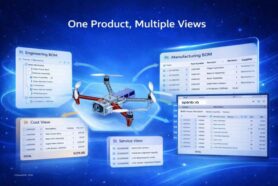
I’m presenting at AU 2024 today. One part of my presentation speaks about the importance of digital workflows in manufacturing. Let’s speak about it in more detail.
Note: if you’re at AU in San Diego, we can talk. I’m presenting today (Wednesday) at Hall C, Stage 3, 4:30 PM PT. You can register for my session through the following link: AU2024 Session Link
Companies don’t buy software. In fact, no one buys software. The real reason we buy software (or use software) is because we need to solve the problem. In other words, we buy results. And those results typically fall into three categories: 1) saving money, 2) making money, or 3) mitigating risks.
When it comes to manufacturing, this translates to optimizing costs, beating competitors to market (speed), and mitigating regulatory, compliance, or operational risks.
The question of how to achieve these results is buried in the process we run and the data we use. By organizing data and optimizing processes, we can achieve those results.
The Power of Data
Data is a new oil. Before manufacturing needed energy resourcing and cheap transportation. Those things are still needed. But these days, manufacturers are looking at how to use data and become data-driven to improve their business, efficiency or operations and effectiveness of the decisions.
To save money, make money, or mitigate risks, manufacturers need access to accurate, real-time data. However, leveraging this data is not a straightforward task. Products are becoming increasingly complex, involving multiple engineers, designers, planners, and teams that must collaborate and validate the information. Traditional methods—spreadsheets, emails, and even faxes (yes, still in use!)—are cumbersome and lead to time spent, mistakes made, and bad outcomes.
At OpenBOM, we understand that the key to better decisions lies in well-organized information. Our tools help companies simplify the data complexity, allowing teams to use their data effectively to make informed decisions. Let’s explore a few examples of how digital workflows are transforming the manufacturing world.
Streamlining the Buying Process
The buying process in manufacturing is very complex and involves many people working together. It requires validating items, quantities, costs, and approvals. Traditional methods of managing this, such as sending quotes via email, manually entering data into spreadsheets, or faxing purchase orders, are outdated and time-consuming. In today’s competitive environment, companies are looking for faster, more digital methods of connecting suppliers, buyers, and data. Based on EY research, 70% of manufacturers are still entering data manually in Excels.
Consider the CAD-to-quote process. It is one of the most frequently used in any manufacturing company. You design products and need to purchase or outsource components.
The same process in our everyday life is digitally transformed. Think about how we now order groceries online or how companies like Costco can identify the right tires for your car simply by your license plate. The transition to digital workflows is happening everywhere. So why should manufacturing be any different?
There is a high demand for how to start using data and build connected workflows between companies in manufacturing. The need for digital data and connected workflows is evident.
Eliminating Mistakes in Complex Products
Mistakes in manufacturing are costly. The same component might be named differently in an MCAD (Mechanical CAD) system than in a PCB (Printed Circuit Board) design tool, leading to discrepancies and errors down the line. This is especially common in complex electro-mechanical processes where teams are designing and collaborating across different disciplines.
Digital workflows can help eliminate these mistakes by ensuring that information is organized and connected from the start. By centralizing product data, digital workflows ensure that every team member is working from the same source of truth, reducing errors in design and manufacturing.
OpenBOM’s Unique Approach to Data Complexity
At OpenBOM, we’ve developed unique technologies to help manufacturers manage the complexity of product data. Our graph-based data organization allows you to connect data throughout the lifecycle of a product, ensuring that every piece of information is linked, accessible, and up-to-date. This connected data model not only simplifies the complexity but also enhances visibility and collaboration across teams.
Speed Is Key
In addition to accuracy, digital workflows bring speed. Think about the traditional method of generating Excel files, sending them back and forth via email, and waiting for approvals. It’s a slow, waterfall process that introduces delays at every step. By transitioning to agile digital workflows, companies can significantly accelerate procurement, engineering, and manufacturing processes. Teams can work in parallel, reducing time to market and allowing you to sell faster and more efficiently.
Conclusion
Coming back to the question about three reasons why someone will use the service – (1) making money, (2) saving money or (3) mitigating risks. Digital workflows in manufacturing aren’t just about adopting new technology—they’re about driving results. By bringing speed, accuracy, and efficiency to your processes, digital workflows help you to achieve those results.
Ready to optimize your manufacturing process?
REGISTER for OpenBOM today to learn more about how our digital tools can transform your business.
Best, Oleg
Join our newsletter to receive a weekly portion of news, articles, and tips about OpenBOM and our community.










